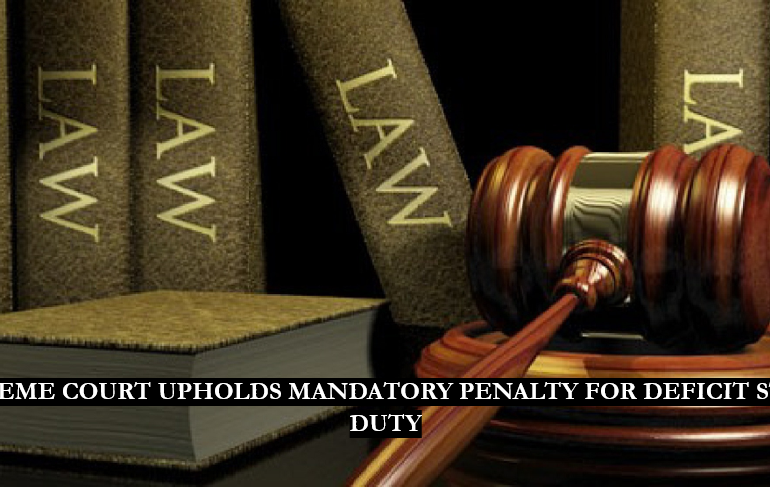SUPREME COURT UPHOLDS MANDATORY PENALTY FOR DEFICIT STAMP DUTY
INTRODUCTION
A two- Judge Bench of the Supreme Court comprising of Justice Hrishikesh Roy and Justice S.V.N Bhatti passed an Order dated 02.09.2024 in N.M. Theerthegowda Vs. Y.M. Ashok Kumar and Others in Civil Appeal No. 10038 Of 2024 [@S.L.P. (Civil) No. 19165 Of 2021] which addresses the contentious issue of deficit stamp duty and penalties under the Indian Stamp Act.
FACTS
The Appellant, N.M. Theerthegowda filed an O.S No. 610 of 2015 for specific performance of an Agreement for Sale dated 04.11.1996. The Agreement was allegedly executed by the Respondents, Y.M. Ashok Kumar and others. Additionally, the Appellant sought to set aside a subsequent sale deed dated 13.08.2003, executed by the Respondent Nos. 1 and 2 in favor of the Respondent No. 3. The core issue revolved around the possession of the suit schedule property as part performance under the said agreement.
The primary issue was whether the Appellant was liable to pay a ten-times penalty on the deficit stamp duty for the unregistered agreement of sale. According to Article 5(e)(i) of the Schedule of the Indian Stamp Act, as amended by Stamp Act No. 8 of 1995, an agreement of sale coupled with possession is deemed a conveyance and thus warrants payment of ad valorem stamp duty.
The Appellant did not produce the original agreement in O.S. No. 610 of 2015, offering the explanation that it was filed in a related case. However, the Ld. Trial Court by an Order dated 14.08.2015 imposed a penalty of ten times the deficit stamp duty, amounting to Rs.15,81,800/- (Rupees Fifteen Lakhs Eighty-One Thousand Eight Hundred Only). This decision was based on the Karnataka High Court ruling in Degambar Warty and others vs. District Registrar, Bangalore Urban District and another ILR 2013 KAR 2099 (DB), which held that “No discretion is granted to the Court to impose a lesser penalty. A power is vested in Civil Court to impound the document.”
The Appellant, aggrieved by the Ld. Trial Court’s Order dated 14.08.2015, filed Writ Petition No. 36970 of 2015 before the Hon’ble High Court. The Appellant argued that the deficit stamp duty should alone be collected at the time of the passing of the judgment and decree, and the levy of penalty is illegal and erroneous. The High Court rejected the said Appeal by the Appellant.
SUPREME COURT ANALYSIS
The Supreme Court observed that the Appellant wanted the suit agreement to be admitted in evidence at the interlocutory stage. On 14.08.2015, the case was posted before the Ld. Trial Court, and the Counsel for the Appellant in the Ld. Trial Court agreed to pay proper/sufficient stamp duty and penalty on the certified copy of the Agreement to Sale. In other words, the Appellant invited the court to decide under Section 34(1) of the Act.
The Court also observed that “Admittedly, the suit agreement is written on stamp papers worth Rs 200. Article 5(e)(i) of the Schedule of the Karnataka Stamp Act, read with amended Stamp Act No 8 of 1995, prescribes the duty as payable on a conveyance. The appellant has not produced the original agreement in suit of 2015. The explanation offered by him is that the agreement is filed in a connected matter between the parties.”
The Court reasoned that the Appellant had invited the Court to decide the issue under Section 34 by agreeing to pay the appropriate stamp duty and penalty on the certified copy of the Agreement to Sell when the decree of specific performance was granted. Therefore, the Appellant could not later argue for an alternative route under Section 37(2) of the Act. On the contrary, Section 37(1) of the Act would apply in the present case. The Court further clarified that the option to send the document to the District Registrar under Section 39 is available only if invoked before the court exercises its jurisdiction under Section 34.
The judgment emphasized that the penalty imposed by the Ld. Trial Court was in line with the statutory requirements, leaving no room for discretion to reduce the penalty amount. The Court noted that the Appellant’s reliance on Sections 37 and 39 was misplaced, given the circumstances and procedural posture of the case.
CONCLUSION
The Supreme Court, in its ruling, upheld the Ld. Trial Court’s decision to impose a ten-times penalty under Section 34 of the Stamp Act. The Supreme Court’s judgment in this case reinforced the strict regulatory framework of the Indian Stamp Act regarding the payment of deficit stamp duty and penalties. By denying any discretion to the civil courts to reduce penalties under Section 34, the Court has highlighted the importance of compliance with statutory requirements.
Kartik Khandekar
Senior Associate
The Indian Lawyer & Allied Services





































Leave a Reply